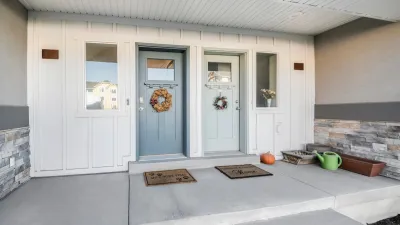A Los Angeles affordable-housing developer says the industry needs to focus more on keeping existing housing affordable.

As California’s governor pushes to streamline affordable housing projects and an upcoming L.A. ballot measure incentivizes affordable units in new developments, it's clear that many approaches to the state’s housing crisis have one thing in common: Their main concern is to create new housing.
But while production is necessary, it’s not the only way to increase the supply of affordable housing—nor is it necessarily the most efficient, one developer argues.
It could take years for California to rebuild its capacity to produce housing on a meaningful scale. In the meantime, John Given says, "We can have an immediate and long-term impact on housing affordability using the rental housing that already occupies much of our cities."
Given is vice chair of LINC Housing, a non-profit affordable housing developer. He has an ambitious vision: In the next 10 years, he hopes to see 20 percent of the rental housing in Los Angeles County operated by social investors with the mission of keeping it affordable or making it that way.
The proposal, in essence, works like this: A social investor buys an operating rental building and charges a mix of affordable and market-rate rents. Over time, tapping into social equity and various sources of public funds, they gradually convert every unit in the building to affordability.
Given elaborates on this business model in The Planning Report, where he also calls on state leaders to direct more funding to this purpose.
"Most operating housing stock is safe, decent, sanitary, and habitable—and a large portion of it is operated at below-market rates," he says. "Shouldn’t a significant portion of dedicated affordable housing funds be prioritized to ensure these units remain affordable?"
FULL STORY: Affordable Housing’s Elephant In The Room: Operating and Preserving Multi-Family Housing

Alabama: Trump Terminates Settlements for Black Communities Harmed By Raw Sewage
Trump deemed the landmark civil rights agreement “illegal DEI and environmental justice policy.”

Study: Maui’s Plan to Convert Vacation Rentals to Long-Term Housing Could Cause Nearly $1 Billion Economic Loss
The plan would reduce visitor accommodation by 25% resulting in 1,900 jobs lost.

Planetizen Federal Action Tracker
A weekly monitor of how Trump’s orders and actions are impacting planners and planning in America.

Wind Energy on the Rise Despite Federal Policy Reversal
The Trump administration is revoking federal support for renewable energy, but demand for new projects continues unabated.

Passengers Flock to Caltrain After Electrification
The new electric trains are running faster and more reliably, leading to strong ridership growth on the Bay Area rail system.

Texas Churches Rally Behind ‘Yes in God’s Back Yard’ Legislation
Religious leaders want the state to reduce zoning regulations to streamline leasing church-owned land to housing developers.
Urban Design for Planners 1: Software Tools
This six-course series explores essential urban design concepts using open source software and equips planners with the tools they need to participate fully in the urban design process.
Planning for Universal Design
Learn the tools for implementing Universal Design in planning regulations.
Caltrans
Smith Gee Studio
Institute for Housing and Urban Development Studies (IHS)
City of Grandview
Harvard GSD Executive Education
Toledo-Lucas County Plan Commissions
Salt Lake City
NYU Wagner Graduate School of Public Service





























